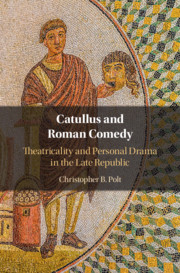Book contents
- Catullus and Roman Comedy
- Catullus and Roman Comedy
- Copyright page
- Dedication
- Contents
- Acknowledgments
- Note on the Text
- Introduction
- Chapter 1 Through the Comic Looking Glass
- Chapter 2 The Best Medicine
- Chapter 3 Heroic Badness and Catullus’ Plautine Plots
- Chapter 4 Naughty Girls
- Epilogue
- Bibliography
- Subject Index
- Index Locorum
Chapter 4 - Naughty Girls
Comic Figures and Gendered Control in Catullus
Published online by Cambridge University Press: 14 January 2021
- Catullus and Roman Comedy
- Catullus and Roman Comedy
- Copyright page
- Dedication
- Contents
- Acknowledgments
- Note on the Text
- Introduction
- Chapter 1 Through the Comic Looking Glass
- Chapter 2 The Best Medicine
- Chapter 3 Heroic Badness and Catullus’ Plautine Plots
- Chapter 4 Naughty Girls
- Epilogue
- Bibliography
- Subject Index
- Index Locorum
Summary
With a few exceptions, Catullus is interested in “bad” women who break the mold, and the more forcefully they do, the more fascinating they are to him. For him, the feminine ideal seems to have been not the bona mulier but the pessima puella, the “naughty girl.” Something similar can be said of Roman comedy, whose malae meretrices are often the stars of the show, and to whom Catullus alludes throughout his poetic corpus. This chapter explores poems in which women are explicitly marked as “bad” and argues that, in each case, Catullus uses their malitia as a way to consider and display tensions that arise when men and women compete for control. These women take on characteristics of comedy’s meretrices callidae, or “clever sex laborers,” while he aligns himself with familiar antagonistic stock types such as the “harsh father” or “braggart soldier,” figures through whom traditional aristocratic values and male concerns are caricatured.
Keywords
- Type
- Chapter
- Information
- Catullus and Roman ComedyTheatricality and Personal Drama in the Late Republic, pp. 148 - 173Publisher: Cambridge University PressPrint publication year: 2021

